Ice Monster (
"I have confidence in the franchise project since Japanese tourists constitute 40 percent of our customer base," Frank Lo (
The first overseas Ice Monster branch may open in spring next year in Tokyo's Shibuya district depending on how quick the Japanese authorities approve of the food-safety of his recipe, Lo said.

PHOTO: GEORGE TSORNG
One franchise owner yesterday said that breaking into the Japanese market would require tailoring products for the Japanese palate.
"Flavors that can be accepted by consumers in that country is a prerequisite," said Johnson Fu (
Fu has franchised out over 700 pearl-milk-tea shops to the US and Asia.
He said challenges may lie ahead for Ice Monster, adding, "A product that sells well in Taipei may not necessarily be successful in Japan."
While the innovative use of chopped mango stacked on shaved ice may have been the latest snack craze five years ago when it first hit the domestic market, Lo said he has been mixing mango and condensed milk into the traditional ice concoction as a summer snack since he was a child.
However, he never expected that his homemade ice recipe could be a marketable franchise.
One customer standing in line in 32?C heat yesterday waiting to munch down a mango ice said she came to Ice Monster -- as opposed to five others in the vicinity -- for two reasons.
"Ice Monster tastes better and, besides, they have the reputation," said Yvonne Fang (
Lo opened his ice stand in its current location in 1995 on Yungkang Street, but came close to shutting it after three years due to poor sales.
His financial woes drove Lo to develop a new flavor -- mango -- at NT$100 per plate.
"The new product soon boosted my business as queues of customers flocked to my door after being told by word-of-mouth by guests who had tried it," Lo said.
In addition to the streams of ice gluttons that consume on average 1,500 plates of shaved ice per day, Lo's mango ice also brought media exposure such as the Japanese food show TV Champion, which put him on the Japanese tourist map, Lo said.
Lo sparked a host of copycats also selling shaved mango ice.
The basic product is quite simple: sliced mango, condensed milk and his homemade syrup.
Lo admits his mango ice has nothing different in it from other ice shops.
"When people ask me about the secret to my success, I always tell them that it was an accident," he said. "Freshness is the key."
Unlike other ice shops that have developed into chain stores nationwide, Lo said he would not mass produce his product until the quality is assured.
Lo has until recently put off a two-year old plan to start the franchise project.
If his mango ice business flies in Japan, however, Lo said he will try to bring the sweet fruit taste to Hawaii and southern California's sizeable Japanese population.

With an approval rating of just two percent, Peruvian President Dina Boluarte might be the world’s most unpopular leader, according to pollsters. Protests greeted her rise to power 29 months ago, and have marked her entire term — joined by assorted scandals, investigations, controversies and a surge in gang violence. The 63-year-old is the target of a dozen probes, including for her alleged failure to declare gifts of luxury jewels and watches, a scandal inevitably dubbed “Rolexgate.” She is also under the microscope for a two-week undeclared absence for nose surgery — which she insists was medical, not cosmetic — and is

GROWING CONCERN: Some senior Trump administration officials opposed the UAE expansion over fears that another TSMC project could jeopardize its US investment Taiwan Semiconductor Manufacturing Co (TSMC, 台積電) is evaluating building an advanced production facility in the United Arab Emirates (UAE) and has discussed the possibility with officials in US President Donald Trump’s administration, people familiar with the matter said, in a potentially major bet on the Middle East that would only come to fruition with Washington’s approval. The company has had multiple meetings in the past few months with US Special Envoy to the Middle East Steve Witkoff and officials from MGX, an influential investment vehicle overseen by the UAE president’s brother, the people said. The conversations are a continuation of talks that

CAUTIOUS RECOVERY: While the manufacturing sector returned to growth amid the US-China trade truce, firms remain wary as uncertainty clouds the outlook, the CIER said The local manufacturing sector returned to expansion last month, as the official purchasing managers’ index (PMI) rose 2.1 points to 51.0, driven by a temporary easing in US-China trade tensions, the Chung-Hua Institution for Economic Research (CIER, 中華經濟研究院) said yesterday. The PMI gauges the health of the manufacturing industry, with readings above 50 indicating expansion and those below 50 signaling contraction. “Firms are not as pessimistic as they were in April, but they remain far from optimistic,” CIER president Lien Hsien-ming (連賢明) said at a news conference. The full impact of US tariff decisions is unlikely to become clear until later this month

Nintendo Co hopes to match the runaway success of the Switch when its leveled-up new console hits shelves on Thursday, with strong early sales expected despite the gadget’s high price. Featuring a bigger screen and more processing power, the Switch 2 is an upgrade to its predecessor, which has sold 152 million units since launching in 2017 — making it the third-best-selling video game console of all time. However, despite buzz among fans and robust demand for pre-orders, headwinds for Nintendo include uncertainty over US trade tariffs and whether enough people are willing to shell out. The Switch 2 “is priced relatively high”